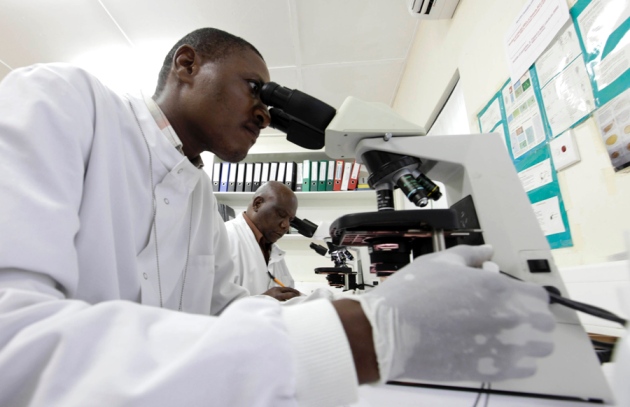Judge says joint UK–Kenya programme thwarted careers of six local researchers.
Article tools

Joseph Okanga/Reuters/Corbis
Kenya Medical Research Institute doctors research malaria and other public-health menaces.
Six Kenyan doctors have been awarded a total of 30 million Kenyan shillings (US$341,000) in compensation for having their career held back by “institutional racism” at a UK–Kenya medical-research
In a landmark ruling handed down by Kenya’s industrial court on 18 July, the doctors were found to have faced “systemic discrimination” while working for the Kenya Medical Research Institute (KEMRI)–Wellcome Trust Research Programme, headquartered in Kilifi.
Samson Gwer, Michael Mwaniki, Nahashon Thuo, John Wagai, Moses Ndiritu and Albert Komba alleged that they were passed over for promotions and grants while working for the programme, which is run in partnership with the University of Oxford, UK, and gets most of its funding from the Wellcome Trust, the United Kingdom's largest medical charity (see 'African researchers sue flagship programme for discrimination').
They also claimed that they did not receive appropriate credit for their research work and that they were put on successive short-term contracts while waiting to start their PhDs, while their European colleagues rapidly moved up the academic career ladder.
Hope for change
KEMRI was the only organization among the programme's sponsors that could be targeted in Kenya because neither the University of Oxford nor the Wellcome Trust are legal entities in the country.
In submissions to the court, KEMRI denied all allegations brought against it. However, in last week’s ruling the judge sided with the plaintiffs. The 47-page judgment says that their professional lives were disrupted “in terms of career development, contribution to scientific outcomes to the country and in terms of ability to get alternative employment and academic scholarships”.
It also says that KEMRI “perpetrated unfair labour practices” by suspending the researchers when they raised their grievances, and for imposing “changed, ambiguous and inferior terms” as a condition for returning to work. Furthermore, the researchers are entitled to access the outcomes of the work they did for the programme, and should have their work formally acknowledged by KEMRI.
The judge ordered the institute to compensate each petitioner to the sum of 5 million Kenyan shillings and said that he hoped that his ruling would “unleash a change of heart and policy” at KEMRI.
A spokesperson from KEMRI said its lawyers disagreed with the judgment, and that they would appeal it “shortly”.
Lessons for others
Gwer says that the ruling sets the stage for a thorough examination of the way in which research partnerships are managed between developing and developed countries. He has now finished his PhD, which he funded himself, and works in the medical physiology department at Kenyatta University in Nairobi.
He also says that he and the other petitioners burnt some bridges in going ahead with the court case. “There are some people who won’t speak to me,” he says. ”But we get some fan mail too from supporters.”
Komba says that the victory will be “meaningless” if international and local research institutions and funders do not learn from it when setting up partnerships. “I am extremely gratified by the decision reached by the court, and it's my hope that it will inform strategies to strengthen systems for safeguarding rights of local researchers, in Africa and globally,” he says.
“We represent many others who haven't had an opportunity to raise their voices,” Komba adds.
Other African medical scientists say they believe that the ruling will have wider-ranging impacts. “In my opinion this shouldn’t cause concern among funders, but raise awareness that their support needs to go beyond merely providing money,” says Thomas Egwang, director-general and founder of Med Biotech Laboratories, a biomedical-research institution in Kampala. “I think donors should take an extra effort to understand local sensitivities and how equitable the distribution of the resources are.”
Marcel Tanner, director of the Swiss Tropical and Public Health Institute in Basel, Switzerland, agrees that future partnerships should look closely at how they build human capacity locally.
In an e-mail to the Wellcome Trust on 18 July, the plaintiffs indicated that they will seek “appropriate redress” and the funder’s “admission of responsibility” in England's court system.
“The Wellcome Trust is not a respondent in this case,” a spokesperson for the charity told Nature. “We are however following proceedings in Kenya with interest. We oppose any form of racial discrimination.”
No comments:
Post a Comment